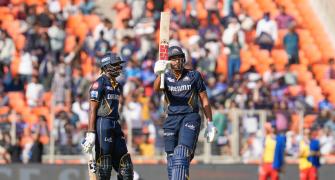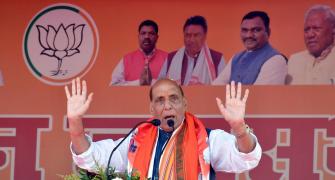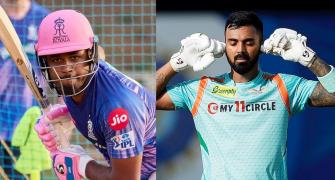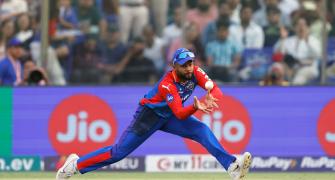In an interaction that followed his remarks to the Atlantic Council, a Washington, DC-based think tank--where he strongly argued that India should restore its dialogue with Pakistan--Haqqani when pressed as to why there has been no action taken against the Lashkar-e-Tayiba elements involved in the Mumbai attacks as India has called for as a condition for the return to talks, said, "To successfully convict them would require us to have the evidence that is available with Mumbai police, with Indian intelligence, with anybody else."
He said, 'The people who were involved in that--to the extent that some of them have been found in Pakistan, have been arrested. They are under trial. It has not been that we do not want to punish these people. We want to punish them as much as our neighbors, but it is not something that can be easily done."
Haqqani said, "The difference of opinion that we have between India and Pakistan on this subject is that India says, first convict the perpetrators of Mumbai and that will facilitate the dialogue with us. We feel that if we have better dialogue, the conviction would be facilitated because that way there will be more exchange of intelligence and information, more exchange of legal and other material and documents and personnel, and it will be easier to convict them."
According to the envoy, "It's a disagreement between us, but it's not a disagreement on intent. We understand that the Indians and Pakistanwant terrorism to be eliminated from our region and we look forward to the day when we will both have enough trust and faith in each other that we will understand that we are both victims and neither one of us has any interest in keeping the terrorist regime going."
When asked if he was contending that because Pakistan doesn't have this intelligence from India, that he couldn't categorically say that there were not elements of the Pakistani government that were involved in the Mumbai attacks, Haqqani got defensive, saying, "I don't think that is a question that I can answer at this particular point."
But then taking a hefty swipe at recent investigative reports by ProPublica and the Washington Post and the New York Times pointing to clear ISI involvement in the 26/11 attacks, he asserted, "All I will say is that I do not consider newspaper reports sufficient basis for anybody's conviction for anything anywhere in the world."
"So, I've read a lot of newspaper reports, (but) in the end, conviction comes through evidence that is presented before judges, conviction is something to which a legal process has to be followed. The fact remains that our court has not yet convicted them and they are under trial and we do look forward to convicting them, when and if we can," Haqqani said.
When participants at the meeting which comprised several US experts on South Asia and a few select journalists, kept pressing him on the widely accepted credible reports by ProPublica and also President Obama's recent statement to the Indian parliament that Pakistan must speedily bring the perpetrators of the Mumbai attack to justice, Haqqani brought up the imprisonment of current president Asif Ali Zardari who was held in Pakistani by previous regimes without a conviction.
"As far as a speedy trial is concerned," he said, "we have a president right now, who was under trial for eight-and-a-half years, without even a conviction or an acquittal. So, just to keep things in perspective, do not always attribute bad motives to slow movement to wheels of justice. That's something you have to understand--that sometimes things do happen that way."
Haqqani then continued to reiterate that "it would facilitate it much more if the Indians will take the position that they will actively participate in the prosecution process and the trial taking place in Pakistan of the persons who were arrested for being involved in the attack in Mumbai," if they were to provide the evidence New Delhi claims it has.
With regard to the case of Pakistani American and LeT operative David Coleman Headley, the Pakistani diplomat said, "If and when evidence and intelligence are two separate things. Newspaper reports are totally different. So, you can have newspaper reporters ostensibly based on intelligence, but that does not always translate into evidence. As long as we have don't have evidence that is judiciable, we don't want to bring these people to trial. We do want to complete their trial. So, we have charged them. They are in prison in Pakistan and we would like to prosecute them with the intention of convicting them," he said. "And, that's what we want our neighbor in India to fully understand."
Haqqani said, "We understand the political compulsions in the aftermath of the Mumbai attacks, but India needs to overcome these and try and build the bridge between the two countries."
He said, "Mumbai was a tragedy that Pakistan felt very strongly about. We were as hurt by what happened in Mumbai as the Indians. We felt strongly that this was an attack on humanity--the people who were killed there were victims of terrorism."
Haqqani said consequently, "Our hearts go out to our neighbors and to the citizens of Mumbai who went through the terrible tragedy."





